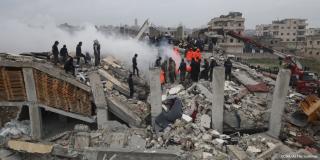
More than 50,000 people have died following devastating earthquakes in Turkey and Syria on 6 February 2023. It is estimated over 23 million people across southern Turkey and northern Syria have been directly impacted by the quakes, and a third smaller earthquake on 20 February.
Efforts are now focused on providing support for those who have lost their homes, loved ones and livelihoods. It is estimated over 1.5 million people are displaced in Turkey and over 5 million people are in need of shelter assistance in Syria.
In Syria, the devastating impacts of this disaster follow 12 years of deadly conflict in which civilians have endured an ongoing humanitarian catastrophe. This new disaster has left close to 9 million people in need of urgent humanitarian support. In the immediate aftermath of the earthquakes, UN aid has been slow to reach the affected areas in the Northwest owing to the ongoing requirement for a Security Council Resolution to ensure UN access into the rebel-hed region.
On 12 February, UN humanitarian chief Martin Griffiths acknowledged that the UN had failed in its response, stating: “My duty and our obligation is to correct this failure as fast as we can.” Subsequently, two extra crossings were opened on 13 February to allow access for more aid following reports that the Bab al-Hawa crossing - up until this point the only crossing open to humanitarians - had sustained damage from the earthquake.
In Turkey, over 35,000 people are reported to have died and 15 million people across 10 regions are affected. While UN agencies are on hand to support humanitarian efforts, the Turkish Government has been condemned by citizens and opposition leaders for its unpreparedness and slow response.
On 14 February the UN launched a $397 million humanitarian appeal to help close to 5 million people in Syria, funding life-saving relief for the next three months. The UN launched a similar appeal on 16 February to assist more than five million people in Turkey, calling for $1 billion to help humanitarian organisations to ramp-up their operations on the ground.
The UK government announced £25 million in new overseas aid on 15 February to support the earthquake recovery effort, including deliveries of family tents and blankets for those displaced by the earthquakes. UK Development Minister Andrew Mitchell visited southern Turkey on 19 February, and met with UN agencies and organisations including the White Helmets and Syrian Women’s groups to discuss what is needed for recovery.
How can you help?
UNA-UK encourages donations directly to organisations that are working to help those impacted by the earthquakes in Syria and Turkey. Below are some of the organisations you can donate to:
Photo: Collapsed building in Sarmada, north-west Syria. 6 February 2023. Credit: UN OCHA/Ali Haj Suleiman via UN twitter
